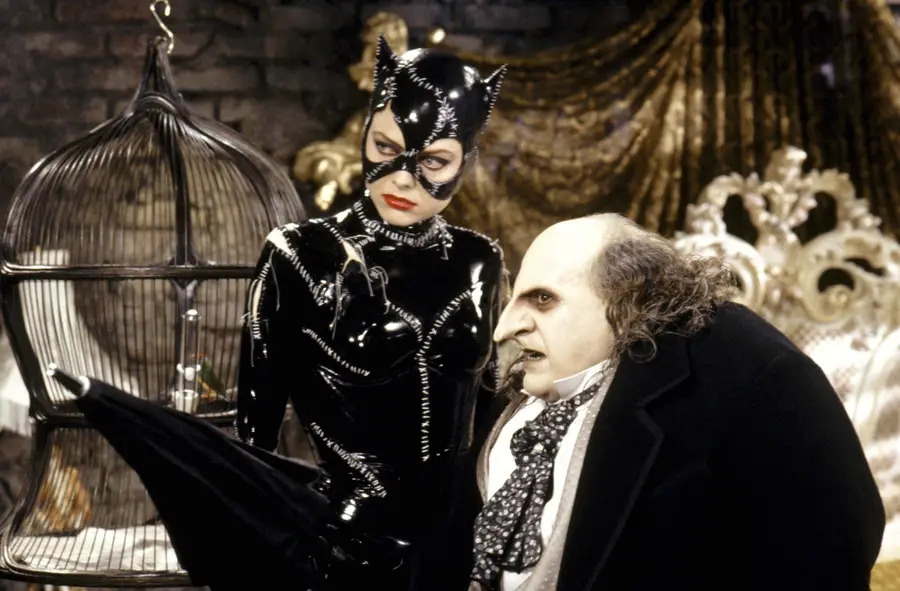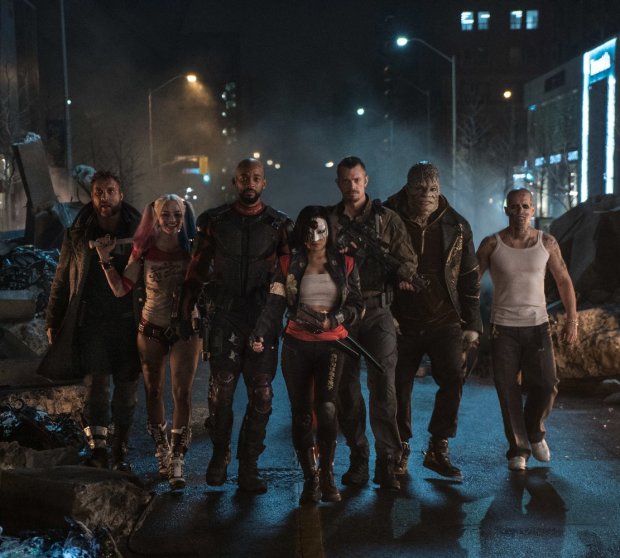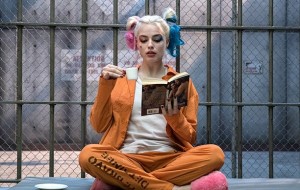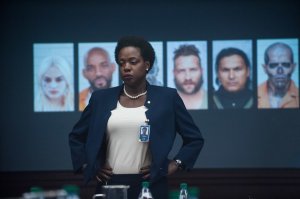Posts Tagged superhero
Batman Returns
Year of release: 1992. Directed by Tim Burton. Starring Michael Keaton, Michelle Pfeiffer, Danny DeVito, and Christopher Walken.

The first (brief) review I wrote of Batman Returns began as follows: “Everything about this film can be explained by simply remembering this is not Batman film, it is not a superhero film, it is a Tim Burton film. And it is a Tim Burton film about three psychopaths with parent issues who costume play while endangering the lives of every resident in Gotham City.”
If you’re wondering who the three psychopaths are, they are Danny DeVito’s Penguin, Michelle Pfeiffer’s Catwoman, and Michael Keaton’s Batman. I believe Batman murders four people in this film—two of whom he kills upon his first screen entrance. DeVito’s grunting, grotesque, and strangely sex-starved Penguin with his bizarre revenge plot is the obvious villain, and while Pfeiffer’s sinister Catwoman is a far cry from the sympathetic Selina Kyle of later screen adaptations, her unresolved parent issues and ticking maternal clock make for a perfectly explosive femme fatale to foil both the Penguin and Batman.
While the Penguin is the obvious villain, Christopher Walken’s business mogul Max Shreck rivals him for control of Gotham City in a game of politics where they continually shift between allies and enemies. Have I mentioned that Keaton’s emotionally repressed Batman and Bruce Wayne is barely in this film? It’s vastly superior to Burton’s 1989 Batman for that alone, and the little we see of this stoic caped crusader only serves to reinforce that he’s as unhinged as his two nemeses.
I, and others, have included Batman Returns on the list of great Christmas movies, because it is set completely around Christmas. For a holiday about the Incarnation, reconciliation between heaven and earth, and a time of general peace and good will on earth, a movie about sexually repressed psychopaths with traumatic childhoods taking out their anger and neuroses on an entire city populace as they all navigate a late-stage capitalist hellscape controlled by one equally corrupt, but boringly idiotic, man simply because he has money, may not seem like a normal choice for festive cheer. However, if there ever were an in absentia depiction of a world that needed a savior, this is it.
A later and more beloved film about the Dark Knight calls him the hero we deserve, not the one we need. In Batman Returns, it’s a stretch even to call him a hero. There is a case to be made that Catwoman is the actual hero here given she sacrifices one of her nine literal lives to murder Shreck, and as the character who bears the brunt of capitalism’s oppression, her insanity has the most natural causes behind it. For the record, I would not make that case—this film has no heroes in my book—but while this incarnation of Catwoman is more evil than later ones, it is possible to say she’s more righteous and realistic than any other character.
Pfeiffer delivers the lines of a repressed and rebellious femme fatale with such camp and passion that the psychopathy of all the major characters comes into focus around her. The contrast of her two entrances into her pink, one bedroom apartment so perfectly captures the transformation of a bachelorette longing for partnership with a burned-out bitch determined to screw over those who have made her life hell, which is noted through the changing set design of her bedroom.
Catwoman’s shifting hatred between Shreck and Batman, may seem unreasonable, but as a psychopath, why should she be expected to think reasonably? As she says, “Life’s a bitch, and so am I,” and she sees to it to dish that bitchiness out to anyone who gets in her way. Also, as both Schreck and Batman are two filthy rich capitalists, they are more similar than not. Thankfully, Batman Returns does not have the handwringing over billionaires using their wealth to save a city as Robert Pattinson’s Batman did. Nor does it entertain any questions about Batman being a hero or a villain as Nolan’s trilogy did, despite Keaton’s Batman being one of the most unethical screen versions of the superhero. It takes the comic book conventions at face value and runs with them, along with running with its own bonkers premise—including, but not limited to, the scene where Pfeiffer self-grooms her leather catsuit and deepthroats a parakeet to intimidate the Penguin.
In the age of the MCU and a general cinematic obsession with realism, I cannot begin to describe how refreshing this straightforward, pulpy camp is to watch. From the practically un-choreographed fight sequences to villains randomly pointing guns in the air to everyone pausing to watch the acrobatics of whom they’re fighting, the lack of realism makes this fantasy world a delight. I’m still not sure I’d call this Burton’s best film, although it is unquestionably a contender, but it is without a doubt the most Tim Burton film ever.
There’s something tragically appropriate about a Christmas film calling a corrupt capitalist the Santa Claus of a city, which is how Shreck is introduced. While Santa is a myth with a tangential relationship to the true meaning of Christmas, there is a rite of passage for many children when they learn the truth about Santa and Christmas presents. In Batman Returns, the orphaned Batman, the rejected Penguin, and the estranged Catwoman were all clearly deprived of healthy, formative relationships with their parents, and letting those family tensions erupt over Christmastime at the cost of an entire society is a delightfully campy masterstroke.
Even more fittingly, in a world that needs a savior, or has lost any spirit of Christmas, mistaking capitalist greed for generosity, which the citizens of Gotham do as they lionize Shreck, makes this tragic hellscape all the more quintessentially Burtonesque. The Gotham police’s reliance on Batman is yet another wish for more money to save the day. The commitment to this campy tragedy escalates perfectly until the only way to wake up from the nightmare is to see mommy kissing Santa Claus. And at that point, as innocence is shattered, no amount of presents or money can solve childhood trauma or capitalism’s injustice. So that’s when you get a cat. Merry Christmas.
Personal recommendation: A+
Suicide Squad
Posted by Evan in Uncategorized on August 3, 2016
Year of Release: 2016 Directed by David Ayer. Starring Margot Robbie, Will Smith, Viola Davis, Cara Delevingne, and Jared Leto.

The biggest problem with DC’s latest attempt to set up the Justice League is that Suicide Squad is nowhere near bonkers enough. Given the original premise, it quickly falls back on generic superhero film tropes, playing it safe and sometimes boring. Basically, Suicide Squad is a remake of The Avengers in which the team of superpeople is compromised by their past unethical actions, which we never really see, raising the question: why aren’t these bad guys, bad?
A flashback tells us Will Smith’s Deadshot is a ruthless assassin, but he spends most of the film worrying about his daughter (and repeatedly telling us he’s a bad guy). Diablo (Jay Hernandez) spends all his time worrying his powers will kill people, because of what the film suggests was technically a tragic accident. Honestly, Batman’s (Ben Affleck) sucker punching of Harley Quinn – disturbingly played for laughs – is more unethical than most of the actions of these supposedly evil villains.
Captain Boomerang and Killer Croc (Jai Courtney and Adewale Akinnuoye-Agbaje, respectively) merely fill in gaps between set pieces; it would make no difference to the plot if they were taken out. And then there’s Margot Robbie as Harley Quinn.
Robbie’s gleeful abandon and scenery chewing is so campy and over-the-top that I couldn’t help enjoy her performance (and, by extension a good chunk of the film as well.) If all the cast had thrown themselves into their characters with equal panache, and if the script had thrown caution to the wind embracing a nonsensical, nonlinear, go-for-broke, style-over-substance method of storytelling, this could have been one of the best superhero films yet. I’m not sure who would constitute the audience for such a film, but I know I’d really enjoy watching it. Wait, that film already exists; it’s called Batman Returns.
Speaking of Burton’s 1992 cos-play camp-fest – which for the record, I think is arguably the best comic book film there is (unquestionably if you exclude Nolan’s Dark Knight) – Michelle Pfeiffer basically played the same type of character that Robbie plays here, and played it better. You could also believe Pfeiffer’s Catwoman was evil and conflicted, unlike Robbie’s Harley Quinn who comes across more as a juvenile delinquent, another undermining of the “bad guys” premise.
As it is, Suicide Squad has glimmers of the campy vitality it needed a lot more of, and for this non-comic book geek, they were enough to make this marginally more enjoyable than Captain America: Civil War. For anyone else who has normal taste, it looks as if Suicide Squad will be roundly hated, which I wouldn’t argue.
Other pluses are director Ayer’s choice to keep the violence on a more contained scale than other recent supertype films, and the choreography of fight scenes is not a chaotic frenzy, even though his color palette quickly becomes monotonous.
 As to actual villains, the film gives us three: Viola Davis’ unethical and eminently hateable antiheroine Amanda Waller, Cara Delevingne’s diabolical Aztec witch Enchantress whom the team must assemble to defeat (and whose plan and final confrontation looks like a knock-off of Gozer the Gozerian with updated special effects), and Jared Leto’s Joker who randomly pops in when the script needs him to throw a wrench into the proceedings. Leto has so little screentime, it’s hard to know what to make of his funny voice and creepy sensual antics, other than it seems he’s going out of his way to make sure no one thinks of Heath Ledger or Jack Nicholson.
As to actual villains, the film gives us three: Viola Davis’ unethical and eminently hateable antiheroine Amanda Waller, Cara Delevingne’s diabolical Aztec witch Enchantress whom the team must assemble to defeat (and whose plan and final confrontation looks like a knock-off of Gozer the Gozerian with updated special effects), and Jared Leto’s Joker who randomly pops in when the script needs him to throw a wrench into the proceedings. Leto has so little screentime, it’s hard to know what to make of his funny voice and creepy sensual antics, other than it seems he’s going out of his way to make sure no one thinks of Heath Ledger or Jack Nicholson.
Like many recent superhero films, the script feels overstuffed with too many characters who make no difference to the plot. I appreciated the efficiency of the opening montage in which Waller details who she’s recruiting and gives us a brief overview of their past, but the film takes no time to develop them later, other than Harley Quinn and Deadshot.
For a film that was meant to make us root for antiheroes as they attempted to do some good, I honestly can’t even call these members of the Suicide Squad that. Either we don’t see them as evil, or the few bad choices they make they later regret and wish to avoid repeating. The result is just another superhero film with two (maybe three) memorable characters and a cast of easily forgettable action-fillers. But the soundtrack uses the opening of Bohemian Rhapsody, so let’s bump it up half a letter grade.
Content Advisory: Much action violence, frequent partial rear nudity, unethical behavior throughout, occasional vulgarity, and a few mild obscenities. MPAA rating: PG-13
Suggested audience: Teens and up with discernment
Personal Recommendation: C+
Batman Begins
Posted by Evan in Uncategorized on May 2, 2015
Can you believe it has been ten years since Nolan made Batman Begins?
Anyway, Ken Morefield graciously published my review debating how well the film has held up at 1More Film Blog.
X-Men: Days of Future Past
Posted by Evan in Uncategorized on May 27, 2014
Year of Release: 2014 Directed by Bryan Singer. Starring Hugh Jackman, James McAvoy, Michael Fassbender, Jennifer Lawrence, Nicholas Hoult, Evan Peters, Peter Dinklage, Ellen Page, Halle Berry, Patrick Stewart, and Ian McKellen.
As a sequel not only to 2011’s X-Men: First Class, but the first three X-men films as well, Days of Future Past had many acts to follow, some notably better than others. This film had to serve not only as a grand finale to the first series, but also lay the groundwork for future films in the current series. I do not envy the scriptwriters who had to put together a coherent story that connected several films which were originally not intended to be connected.
The way that the filmmakers achieved a follow-up to four (or six) previous X-Men films from different timelines is fairly ingenious. When a war with mutant killing machines, the Sentinels, has nearly eradicated the mutants and any humans who might one day give birth to a mutant, Professor X and Magneto, (Patrick Stewart and Ian McKellen) having reconciled their differences, have Shadowcat (Ellen Page) send Logan (Hugh Jackman) back in time to find their younger selves (James McAvoy and Michael Fassbender) and convince them to stop Mystique (Jennifer Lawrence) from killing Dr. Trask (Peter Dinklage), during which she would be captured and her DNA used to implement Trask’s design for mutant killing Sentinels.
Sending Logan back in time consists of Shadowcat projecting Logan’s current consciousness onto his 1973 self, where armed with the foreknowledge of the future, he can persuade the other X-Men to change their actions, thus altering history and causing the Sentinels never to come into existence. While he is at it, Logan’s rewriting of history will also cause X-Men 3, which everyone hated, never to have happened.
In addition to undoing the storyline of X-Men 3, Days of Future Past somewhat feels like an apology for that film. Bryan Singer, who left the franchise after X-Men 2, returns to direct, and he is at the top of his game. He stages the action scenes with a sense of fun, never obscuring the action with chaotic editing, and for the most part keeps the action on a reasonable sized scale. The louder, noisier, ever increasingly violent excess of last summer’s Man of Steel is not on display here. There are a couple very large set pieces, but those seem believable within the world of the film, and they occur at logical climaxes. It does seem that some mutants, notably Quicksilver (Evan Peters), are powerful enough to solve almost any problem, which raises the question as to why they don’t use their powers towards the film’s end, but that is an oversight which is fairly easy to forgive amidst the enjoyable display of mutant powers that we do see.
Days of Future Past brings together what is probably the largest cast of superheroes in any recent film, and all of them manage to be memorable, even if in a few cases that is due more to special effects than character development. However, the central figures: Wolverine, Professor X, Beast, Magneto, and Mystique all well written, they have very good chemistry with one another, and the actors turn in convincing performances. For that matter, the entire cast gives it their all, and they are a joy to watch. Quicksilver’s major action set piece is hilarious, and it makes very clever use of slow motion, something I have not seen in an action film in a long time.
Being a time travel film, there are naturally some discontinuities. The generic script has to mildly contradict previous films at some points, and the ending raises more questions than it answers, even if it does permit one mutant to reappear in sequels he might not otherwise have been in. Despite the minor flaws, X-Men Days of Future Past is an exciting, intelligent superhero sequel during a time of uninspired, by the numbers superhero films that left me looking forward to the next outing with these characters.
Content Advisory: Fleeting rear nudity, quasi-nudity throughout, a mildly suggestive scenario, much action violence, some crass language and one strong vulgarity. MPAA rating: PG-13
Suggested Audience: Teens and up
Personal Recommendation: B
Man of Steel
Posted by Evan in Uncategorized on June 14, 2013
Year of Release: 2013 Directed by Zack Snyder. Starring Henry Cavill, Amy Adams, Michael Shannon, Diane Lane, Kevin Costner, and Russell Crowe.
I will come right out and say it: I was bored out of my mind watching Man of Steel. The entire film was basically one explosion followed by a bigger explosion with no character development or any genuine sense of conflict in which the outcomes were at stake. As a result, I could not have cared less about any of the characters or countless battles.
The movie starts well enough. There are impressive visual effects as Krypton is attacked by the rebellious General Zod (Michael Shannon), and it is fairly exciting to watch as Jor-El (Russell Crowe) hurries to save his newborn son by sending him to earth. There is a sense of uncertainty and real conflict in the dialogues between Jor-El and Zod. In the brief opening moments, Crowe receives enough screen time to bring a sense of empathy to his character, which makes his death tragic and poignant. Unfortunately that urgency and emotion never returns to the movie after the opening scene.
The movie then jumps to Earth where the adult Clark Kent (Henry Cavill) drifts aimlessly with a scruffy beard and no sense of purpose, very much like Bruce Wayne in producer Christopher Nolan’s Batman Begins. Clark occasionally rescues people displaying his Superman abilities, but then quickly disappears to guard his secret powers. After a while he decides to search for his true purpose and identity, and he receives training from his father in an isolated arctic environment (also like Batman Begins).
Clark’s years as a child are filled in via flashbacks. There are scenes of him learning to focus and overcome his sensory overload, working in a diner, and saving a school bus that blew a tire and fell into the river. The last incident led to him being lectured by his adoptive father (Kevin Costner) that he must keep his powers secret so the world would not hate him. This belief culminates in a totally unbelievable scene in which Clark decides not to use his powers. The other flashbacks, which could have been touching and created empathy for the characters, are cut short by Clark misusing his powers, once as a petty act of revenge. There could have been an intriguing learning curve for Clark as he grows into the icon of Superman, but the scenes of him being a jerk are just played for laughs and then forgotten as the film wears on.
A major difference between Man of Steel and Nolan’s Dark Knight Trilogy, or The Avengers, or the Iron Man Trilogy, or (name nearly any superhero film) is that all those other films have characters the audience cares about. Henry Cavill is a fairly flat Superman, but David Goyer’s script is just as much to blame. Amy Adams spends too much time being a know-it-all to feel like her Lois Lane is ever in jeopardy. Even the talented Michael Shannon is hardly menacing as General Zod. The only character who brought any interest to the movie was Russell Crowe as Jor-El, effective both in his action scenes and in his role as a mentor.
Those other superhero films also all have storylines in which the outcome is at risk. Or if the outcome is predictable, at least there is a sense of fun at watching the heroes go through their routines. Man of Steel has neither uncertainty nor fun. The film takes itself every bit as seriously as Nolan’s Dark Knight Trilogy without a villain that remotely challenges the hero, like The Joker and Ra’s al Ghul challenge Batman. For all its plot-holes and absurd twists, Iron Man 3 clearly enjoyed itself, and even the villain in that film felt closer to succeeding than General Zod ever is.
Admittedly in a Superman movie, the audience knows that ultimately Superman will triumph over the villains, but there should be the possibility of the villains succeeding. General Zod’s ultimate quest to kill Superman is clearly impossible, especially in the reboot of a major franchise. The filmmakers should have shifted his quest to focus on retrieving his desired object, not killing Superman. Even if the audience knows Superman will ultimately save the world, there could have been a period of real uncertainty had it seemed like Zod was capable of acquiring the object he needed.
Even the action scenes have no risk or urgency to them. Superman and the Kryptonians simply take turns pummeling and throwing each other through more and more buildings. By the end of the film, if Zod’s goal had been to eradicate mankind, he should have come close to succeeding, but it appears no one died (or at least no one important) despite the catastrophic damage that would rival that of an atomic bomb. There were even three giant explosions that cause the screen to white out. Normally one of those is the apex of the action, and the film then wraps up, instead it drags on to another bigger battle.
The conclusion was another problem. Once Zod’s threat had been eradicated, the filmmakers still crammed one more fight scene into the film, even though it was obvious that Superman had won at that point. This final fight served no purpose to the plot other than to drag the film out and suck out the little energy it had left.
How apathetic was I toward Man of Steel? How is this for a litmus test: Superman’s final action may or may not have been unethical and a complete betrayal of the character. By that point I was too bored to even care, and was just grateful the film was finally ending.
Content Advisory: Incessant explosions and bloodless action violence; some crass and mildly suggestive language. MPAA rating: PG-13
Audience: Teens and up.
Personal Recommendation: D+